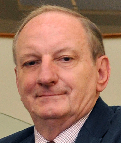|

|
Professor Edward S. Fry
Department of Physics and Astronomy
Texas A&M University, College Station TX |
Abstract: Einstein believed that quantum mechanics was an incomplete theory. In that context, he is famously quoted from a letter he wrote to Max Born in 1944: “You believe in God playing dice and I in perfect laws in the world of things existing as real objects...” The interpretation of quantum mechanics will be discussed, and the decades long history of this contentious problem will be reviewed. A breakthrough analysis by John Bell in 1964 made it possible to experimentally test these heretofore philosophical arguments. Results of the experimental tests of the Bell inequalities will be described and their present status will be discussed. Finally, the possibility of a true experimental realization of Bohm's classic version of Einstein-Podolsky-Rosen's famous Gedankenexperiment will be described. Specifically, the experiment involves measurement of angular momentum correlations between two spin one-half fermions – the nuclei of mercury 199 atoms. The latter are produced by a resonant Raman dissociation of a mercury dimer that is in an electronic and nuclear spin singlet state; the latter is guaranteed if the initial state has an even rotational quantum number (we start with dimers in a J=10 state). The mercury dimers are produced in a free jet expansion so that transitions from the rotational states are fully resolved. Determination of the angular momentum components of the resulting two mercury atoms is accomplished simultaneously with their detection via a polarization selective excitation and ionization scheme.
About the Speaker: Dr. Fry (Ph.D. Univ. of Michigan, 1969) is Distinguished Professor and George P. Mitchell Professor of Physics in Texas A&M University, a recognized international leader in the foundations of quantum mechanics, in experimental laser physics and light scattering phenomena. His landmark test of local hidden variable theories in 1975 provided a decisive test of Einstein’s concerns about quantum mechanics and resolved the discrepancy between the first two experimental tests. His integrating cavity technique allows for scattering-free measurement of optical absorption. The measured results for pure water are now the standard reference data (13th most cited paper in the history of the journal Applied Optics). His high-reflectivity diffuse reflector opens a new era of ring-down spectroscopy in an integrating cavity even when the sample produces significant scattering. Professor Fry’s other contributions include: (i) new technique for narrow linewidth laser operation in severe acoustic and vibrational environments; (ii) first observations of lasing without inversion; (iii) new device for accurate measurements of integrated back scattering. Professor Fry is a Fellow of both the American Physical Society and the Optical Society of America.
Date&Time: February 24, 2014 (Monday), 10:00-11:00 a.m.
Location: 606 Conference Room, No.3 Heqing Road, Haidian District


